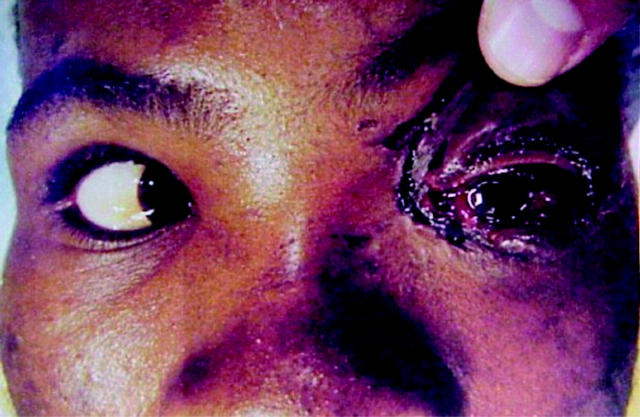Severe ocular trauma caused by an ostrich
Authors: L M Levitz, T R Carmichael, and M Nissenbaum
The ostrich is a strange and harmless looking bird; however, in Africa attacks by ostriches on humans are not uncommon and sometimes result in death. We recently treated such a patient with an eye injury.
Case report
A 35 year old male patient presented with an injury sustained from being kicked in the face by an ostrich (Struthio camelus).
On examination the right eye was found to be normal but he had vision of bare light perception on the left with proptosis of the globe and severe chemosis of the conjunctiva. Both upper and lower lids were avulsed medially. There was limitation in all positions of gaze which was more noticeable on attempted abduction (fig 1). The eye was soft and he had an oedematous cornea and a full hyphema. The posterior segment could not be visualised.

Blunt trauma to left eye with absence of abduction.
Computed tomography showed a blowout fracture of the left orbit (fig 2). There was a fracture of the left nasal bone with a comminuted lateral wall fracture. The medial orbital wall was also fractured with opacification of the left ethmoid sinus and herniation of the medial rectus into the sinus.

Computed tomography showing blowout fracture into the ethmoid sinus and comminuted lateral wall fracture.
An intraocular haemorrhage as well as haemorrhage in the retrobulbar space was noted.
Under general anaesthesia, both the upper and lower lids were repaired and the hyphema was washed out. A posterior rupture1 was suspected clinically but the site of rupture could not be identified. The eye was subsequently eviscerated.
Comment
Ostriches usually inflict injury in one of two ways: the more serious injury is that of a slash or laceration, usually to the lower abdomen or limbs, caused by the ostrich kicking in a forward and downward motion with its powerful foot. The toenail of the ostrich is sharp and is used by the ostrich for protection against predators. The second type of injury is seen more commonly. This occurs when the ostrich uses its bony breast plate as a ram to knock the person to the ground. The ostrich then jumps upon the victim and, because an ostrich weighs 75–150 kg, this may cause contusion of the torso with rib fractures.
Our patient was bending while repairing a fence when he was kicked by an ostrich. He was struck in the face and sustained extensive facial trauma extending from his nasal bones to his orbital walls and ethmoidal sinus. The trauma also resulted in irreparable blunt trauma to the eye.
The injury caused was severe with no possibility of repair of the globe, and is the only documented case of an eye being lost due to injury by an ostrich
References
1. Kuhn F, Morris R, Witherspoon CD, et al. A standardized classification of ocular trauma. Ophthalmology 1996;103:240–3. [PubMed] [Google Scholar]
2. Salvat SA. Hunters and Hunted of the Savannah. London: Orbis, 1971:155.
Articles from The British Journal of Ophthalmology are provided here courtesy of BMJ Publishing Group